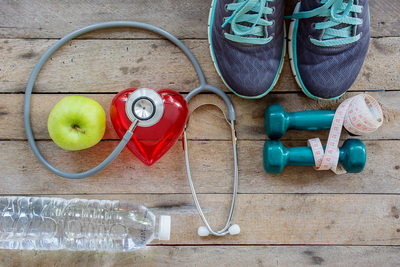The 10 Do’s and Don’ts For Heart Health
At Seattle Sutton’s Healthy Eating, we take heart health seriously. Along with our heart-healthy meals that meet the guidelines from the American HeartAssociation, we strive to motivate everyone to adopt healthy lifestyles to prevent heart disease. Part of this includes keeping a heart healthy diet. After all, when you have a healthy heart, you have a healthy YOU! Here’s a list of 10 ways to keep your heart healthy, broken down into 5 do’s and 5 dont's.
10 Ways to Keep Your Heart Healthy

The Heart Health Do's:
1. Eat Better: A healthy, balanced diet like the one Seattle Sutton’s Healthy Eating serves is key to optimal health, including heart health. Remember to strive for a colorful plate of produce at each meal and consume whole grains and at least two servings of ‘fatty’ fish high in omega 3 fatty acids each week. Lean sources of protein, including vegetarian sources such as beans, nuts, and legumes are also ideal.
Cutting back on added sugars, saturated fats, and processed foods is important as it frees up room for healthy foods and takes out items that are nutrient-poor and linked to undesirable heart makers. Added sugars are known to raise triglycerides and may lead to weight gain by providing excess calories to the diet. Saturated fats are linked to an increase in total cholesterol and processed foods lack vitamins and minerals and often add significant amounts of sodium to the diet which can impact your blood pressure.
2. Exercise daily: Only about 1 in 5 adults and teens get enough exercise to maintain good health. Once cleared by your physician, one of the best ways to combat heart disease is to ‘get moving.’ What that means to you depends on your health, age, and physical condition. Walking is a wonderful exercise, as is housework. Be sure to check with your medical team before starting any activity. Aiming for at least 30 minutes a day will improve the condition of your heart. Getting the recommended physical activity per week helps to lower the risk for heart disease, stroke, type 2 diabetes, high blood pressure, and more. It also improves some of the other things on this list such as better sleep, less stress, better quality of life, and can help you feel connected and make new friends.
3. Manage stress: Many studies link anger and stress to heart disease. It's best to find alternatives to manage stress to reduce heart disease risks. The National Institutes of Health (NIH) defines emotional wellness as “the ability to successfully handle life’s stresses and adapt to change and difficult times.” If you feel sad or angry, or stressed on a regular basis, you may develop other health problems. According to Diabetes Self Management, your feelings don’t directly cause physical issues, but they affect your self-care behaviors. This may include drinking too much alcohol, skipping out on exercise or sleep, stress eating, or turning to drugs or alcohol to cope with negative emotions. The consequences of these behaviors could lead to poor health and increased risk for disease.
4. Sleep: You may want to eat more and move less with less sleep than recommended each night. So, it’s best to find the right amount for you and be sure to get your rest. To help yourself get better rest, try setting a bedtime and sticking to it, turning off electronics at least one hour before bed, and skipping the caffeine, alcohol, and nicotine before bedtime.
Inadequate sleep is associated with poor diet quality, decreased insulin sensitivity, hyperglycemia, and cardiometabolic risk factors. It also leads to alternations of hormones including cortisol, leptin, and ghrelin, which can lead to dysregulation of hunger and unhealthy eating habits including larger portion sizes, increased hunger, high-calorie food choices, and increased food and sugar-sweetened beverage intake.
5. Nurture Close Relationships: Good interpersonal ties boost the cardiovascular system, and people who are socially isolated or lonely are more likely to have a heart attack or stroke. Loneliness is on the rise and feeling lonely has been connected to a 26% increase in a person’s risk for dying early. Over time feeling lonely can lead to hypertension, or high blood pressure, which can increase the risk for cardiovascular disease. A few close family members or friends will do. Are you worried your social network is dried up and not sure where to turn? Let your passions guide you. Start volunteering, join a walking group, find a local book club, or regularly attend a class that interests you. Finding people with the same interests as you and putting yourself out there will help you meet some wonderful people with many similarities to you. Maybe you can replenish an old friendship by picking up the phone or setting up a quick coffee date. Your heart and your friend will both be thanking you!
The Heart Health Don’ts:
1. Diabetes: Having type 2 diabetes puts you at greater risk for heart disease. Well-controlled blood sugar and insulin levels are key to managing the disease and keeping heart disease at bay. It is important to work with your healthcare team to manage your diabetes, which may include the use of medications. It is wise to check your blood sugar frequently to learn how changes in your diet or activity level impact your blood sugar readings. Try to adopt an overall healthy lifestyle to help reduce your risks of complications
2. Smoking: It’s the #1 contributor to heart disease and also puts one at risk for cancer and future heart attacks. The good news is, the moment a smoker stops smoking, the risks are immediately reduced. Set a quit day within the next week and commit to people who will support you. There are 3 ways to quit smoking so pick the method that’ll work best for you.
a) “Cold Turkey”
b) Decrease the amount you smoke each day until you stop completely.
c) Reduce the number of puffs you normally take from each cigarette each day. Keep reducing the number of puffs and keep track in a calendar. On your “Quit Day,” stop smoking completely.
Heart disease can be prevented and controlled by following your treatment plan, which includes quitting smoking. Throwing those cigarettes out for good is one of the best things you can do to improve your overall health and add years to your life.
3. High blood pressure: Hypertension, as it’s also called, causes wear and tear on blood vessels and damages arteries and kidneys. The more blood your heart pumps paired with the narrowing of your arteries, the higher your blood pressure. Uncontrolled high blood pressure increases your risk of serious health problems, including heart attack and stroke. On the upside, the damage can be mostly corrected with exercise and a healthy diet.
Working to achieve a healthy weight will help to lower your blood pressure. Even a weight loss of just 5% can show results with lowered blood pressure. The more you weigh, the more blood you need to supply oxygen and nutrients to your tissues. As the amount of blood increases so does the pressure on your artery walls. Too much salt in your diet can lead to fluid retention which increases blood pressure. And having too little potassium in your diet could throw off the balance of sodium in your cells. Focus on reducing restaurant meals and processed foods and adding in more fruits and vegetables.
4. Obesity: Being overweight puts wear on the body, joints, and blood vessels putting stress on the heart. Being obese can cause high cholesterol and triglyceride levels and can cause your blood pressure to rise as well. Where you carry the extra weight seems to matter, too. According to research, belly fat is of particular concern when it comes to risk for heart disease. Losing weight can have a positive impact on heart health, even as little as 10 to 20 pounds. Choosing to get healthy with regular exercise and a nutritious diet is the number one thing to focus on. Make small, attainable goals for your weight, and know that every little bit counts. Focus on changes that you can stick to for the long term, not just a quick fix.
5. Consume an Excess Amount of Alcohol: For some, alcohol is a normal part of their routine. To relax and unwind after a long day or to celebrate special occasions or the weekend, sipping a glass of wine, a beer, or a cocktail may become regular. But research shows that drinking excessive alcohol can lead to a weakened heart muscle and irregular heart rhythms, and can lead to a stroke. Per the American Heart Association, moderate alcohol consumption means an average of one to two drinks per day for men and one drink per day for women.
If you don’t drink already, don’t start. If you do drink, talk with your Dr. about the benefits and risks and the recommended amounts for you. Drinking too much can raise your triglycerides. If your triglycerides are high and you have high LDL (bad cholesterol) or low HDL (good) cholesterol, this can leave fatty buildup in the artery walls. This can increase your risk of heart attack and stroke. Excessive alcohol can also lead to high blood pressure, cardiomyopathy, and cardiac arrhythmia. Binge drinking, which is defined as having 5 or more drinks in two hours for men and 4 or more for women, may increase your risk for atrial fibrillation, an irregular heartbeat that can lead to blood clots, stroke, and heart failure.
Put Your Heart First
Sticking to the above tips will not only ensure that your heart is healthier, but it will also have numerous benefits to your health overall. Stay physically active, eat healthy foods, get enough sleep, and maintain good ways to manage stress will help your heart stay healthy and keep your risks low. By being conscious of what you are putting into your body, you will get so much more out of it! Here's to you and your heart!
Not only do we create heart-healthy meal plans at Seattle Sutton's, but we also create meal plans that have numerous health benefits. If you are ready to focus on your health, looking, and feeling better, then take a look at why Seattle Sutton's Healthy Eating is your solution. Enjoy!




